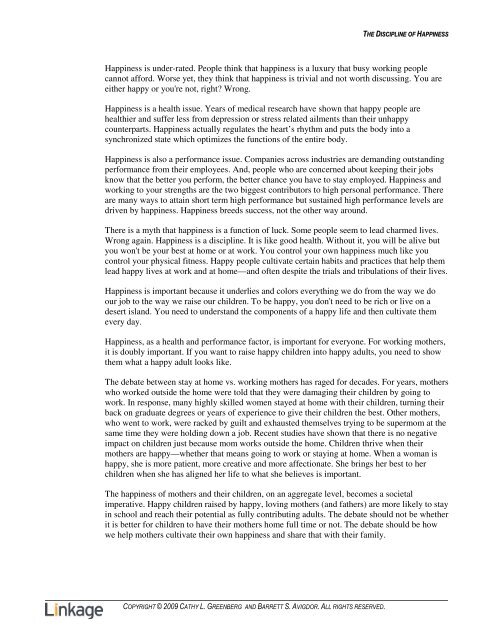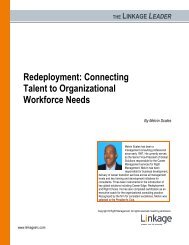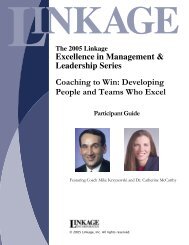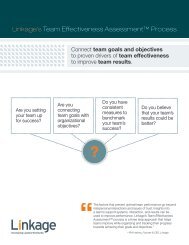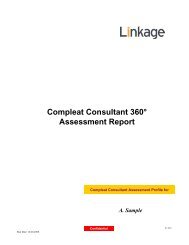The Discipline of Happiness - Linkage, Inc.
The Discipline of Happiness - Linkage, Inc.
The Discipline of Happiness - Linkage, Inc.
You also want an ePaper? Increase the reach of your titles
YUMPU automatically turns print PDFs into web optimized ePapers that Google loves.
THE DISCIPLINE OF HAPPINESS<br />
<strong>Happiness</strong> is under-rated. People think that happiness is a luxury that busy working people<br />
cannot afford. Worse yet, they think that happiness is trivial and not worth discussing. You are<br />
either happy or you're not, right? Wrong.<br />
<strong>Happiness</strong> is a health issue. Years <strong>of</strong> medical research have shown that happy people are<br />
healthier and suffer less from depression or stress related ailments than their unhappy<br />
counterparts. <strong>Happiness</strong> actually regulates the heart’s rhythm and puts the body into a<br />
synchronized state which optimizes the functions <strong>of</strong> the entire body.<br />
<strong>Happiness</strong> is also a performance issue. Companies across industries are demanding outstanding<br />
performance from their employees. And, people who are concerned about keeping their jobs<br />
know that the better you perform, the better chance you have to stay employed. <strong>Happiness</strong> and<br />
working to your strengths are the two biggest contributors to high personal performance. <strong>The</strong>re<br />
are many ways to attain short term high performance but sustained high performance levels are<br />
driven by happiness. <strong>Happiness</strong> breeds success, not the other way around.<br />
<strong>The</strong>re is a myth that happiness is a function <strong>of</strong> luck. Some people seem to lead charmed lives.<br />
Wrong again. <strong>Happiness</strong> is a discipline. It is like good health. Without it, you will be alive but<br />
you won't be your best at home or at work. You control your own happiness much like you<br />
control your physical fitness. Happy people cultivate certain habits and practices that help them<br />
lead happy lives at work and at home—and <strong>of</strong>ten despite the trials and tribulations <strong>of</strong> their lives.<br />
<strong>Happiness</strong> is important because it underlies and colors everything we do from the way we do<br />
our job to the way we raise our children. To be happy, you don't need to be rich or live on a<br />
desert island. You need to understand the components <strong>of</strong> a happy life and then cultivate them<br />
every day.<br />
<strong>Happiness</strong>, as a health and performance factor, is important for everyone. For working mothers,<br />
it is doubly important. If you want to raise happy children into happy adults, you need to show<br />
them what a happy adult looks like.<br />
<strong>The</strong> debate between stay at home vs. working mothers has raged for decades. For years, mothers<br />
who worked outside the home were told that they were damaging their children by going to<br />
work. In response, many highly skilled women stayed at home with their children, turning their<br />
back on graduate degrees or years <strong>of</strong> experience to give their children the best. Other mothers,<br />
who went to work, were racked by guilt and exhausted themselves trying to be supermom at the<br />
same time they were holding down a job. Recent studies have shown that there is no negative<br />
impact on children just because mom works outside the home. Children thrive when their<br />
mothers are happy—whether that means going to work or staying at home. When a woman is<br />
happy, she is more patient, more creative and more affectionate. She brings her best to her<br />
children when she has aligned her life to what she believes is important.<br />
<strong>The</strong> happiness <strong>of</strong> mothers and their children, on an aggregate level, becomes a societal<br />
imperative. Happy children raised by happy, loving mothers (and fathers) are more likely to stay<br />
in school and reach their potential as fully contributing adults. <strong>The</strong> debate should not be whether<br />
it is better for children to have their mothers home full time or not. <strong>The</strong> debate should be how<br />
we help mothers cultivate their own happiness and share that with their family.<br />
COPYRIGHT © 2009 CATHY L. GREENBERG AND BARRETT S. AVIGDOR. ALL RIGHTS RESERVED.


